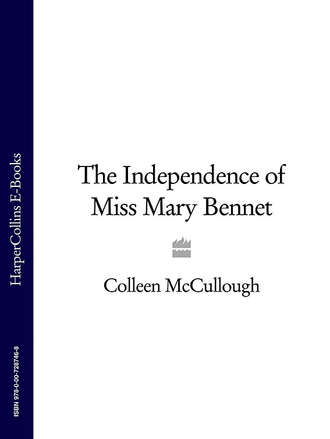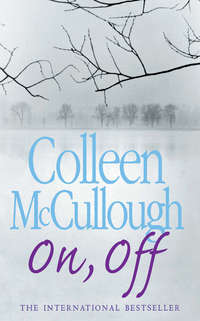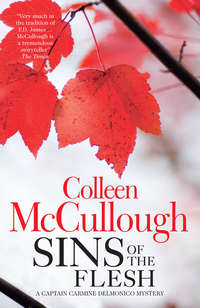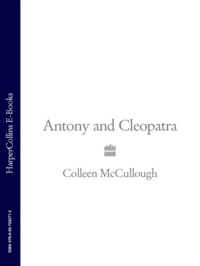
Полная версия
The Independence of Miss Mary Bennet
His eyelids drooped; some time later Angus sat up with a jerk to find that he had nodded off, and laughed softly. He had dreamed of a skinny, hatchet-faced female clad like a governess and marching up and down outside the Houses of Parliament carrying a placard that said REPENT, YE EXPLOITERS OF THE POOR! How Argus would love that! Besides which, however, no ladies ever marched up and down outside any Westminster building. The day they did that, he thought wickedly, the whole pile would tumble down.
Was she a skinny, hatchet-faced female in the garb of a governess? he wondered as he closed the folder and put it back where it belonged. If Elizabeth’s sister, then surely not! Yet what spinster owned beauty? None, in his experience. She bore the Christian name of Mary, but how was he going to find out what her surname was? Then a memory surfaced: of Fitz saying Mary Bennett — one t or two? Two. One left the name looking the victim of amputation. Miss Mary Bennett … Who lived in Hertford, a mere skip from London. How old was she?
The vision of Elizabeth had haunted him for ten years, and to find that she had an unmarried sister was irresistible. Yes, he would have to see Miss Mary Bennett, enamoured of Argus! Poor Elizabeth! A wretchedly unhappy creature. Well, what woman could be happy married to Fitz? One of the coldest men Angus had ever met. Though exactly how did one define cold, when applied to human beings? Fitz was not devoid of feelings, certainly. He had feelings — strong ones, too. The trouble was that they existed beneath an exterior made of ice. And Elizabeth had probably thought she could melt that ice when she married him. I have read, Angus mused, of a volcano covered in snow and glaciers, yet still, in its depths, a boiling pit of white-hot lava. And that is Fitz. God spare me from the day of the eruption! It will be devastating.
On his way to bed Angus notified the under-butler on duty that he would be going out of London for two weeks on the morrow; would he kindly inform Stubbs of that fact at once?
When commencing a mission to collect facts for Argus personally, Angus Sinclair’s practice was to go first to the local legal chambers. Just because this was a mission to discover what sort of woman Elizabeth’s spinster sister was did not mean a different approach. A Ned Skinner might have preferred taprooms and stables, but Angus knew lawyers were like a maypole: all the threads connecting a district came together in them. Of course this was only true in small towns, but England was a place of small towns and villages. Big towns and cities were a result of that new phenomenon, industry on a scale undreamed of in the days of Charles Bingley’s grandpa.
Conveyed into the courtyard of the Blue Boar, there to deposit his chaise, his baggage and his valet, Angus discovered from the landlord that Patchett, Shaw, Carlton and Wilde was the firm of solicitors patronised by Hertford’s best people, and that the man to see was Mr Robert Wilde.
In Mr Robert Wilde he found a younger, more presentable, less hidebound man than he had expected, and decided to appear frank. Of course his name had been recognised; Mr Wilde knew him for a hugely rich fellow from north of the Border as well as the proprietor of the Westminster Chronicle.
“I am a great friend of Fitzwilliam Darcy’s,” Angus said easily, “and have learned that he has a sister-in-law residing in Hertford. A Miss Mary Bennett — is that one t, or two?”
“One,” said Mr Wilde, liking his visitor, who had a great deal of charm for a Scotsman.
“As I feared, an amputation — no, no, Mr Wilde, I am being whimsical! It is not on Mr Darcy’s behalf that I am here. In actual fact I’m on a trip into East Anglia, and Hertford being on my way, I thought to call on Miss Bennet with news of her sister Mrs Darcy. Unfortunately I left in such a hurry that I did not think to obtain Miss Bennet’s address. Can you furnish it?”
“I can,” said Mr Wilde, eyeing Mr Sinclair with some envy: a striking-looking man, between the silvering sandy hair above an attractive face, and the fashionably tailored apparel that shouted his means and his social pre-eminence. “However,” he said smugly, “I am afraid that you will not be able to pay her a call. She does not receive gentlemen.”
The blue sailor’s eyes widened, the fine head went to one side. “Indeed? Is she a misanthrope? Or indisposed?”
“Perhaps a little of the misanthrope, but that is not the reason. She has no chaperone.”
“How extraordinary! Especially in one connected to Mr Darcy.”
“If you had the privilege of knowing her, sir, you would better understand. Miss Bennet is of extremely independent turn of mind.” He heaved a sigh. “In fact, she is fixated upon independence.”
“You know her well, then?”
The Puckish cast of Angus’s countenance lulled most of those who met him into confiding facts to him that were not, strictly speaking, any of his business; Mr Wilde succumbed. “Know her well? I doubt any man could say that. But I had the honour of suing for her hand some time ago.”
“So I must congratulate you?” Angus asked, feeling a twinge of excitement. If Miss Bennet had elicited a proposal of marriage from this well set up and prosperous young man, then she could not be either skinny or hatchet-faced.
“Lord, no!” cried Mr Wilde, laughing ruefully. “She refused me. Her affections are reserved for a name in your own journal, Mr Sinclair. She can dream of no one save Argus.”
“You do not seem cast down.”
“Nor am I. Time will cure her of Argus.”
“I am well acquainted with Mrs Darcy, also with another of her sisters, Lady Menadew. The most beautiful of women!” Angus exclaimed, throwing a lure.
Mr Wilde took it, hook and sinker. “I believe Miss Mary Bennet has the edge on both of them,” said he. “She is in the mould of Mrs Darcy, but she is taller and has a better figure.” He frowned. “She also has qualities more difficult to define. A very outspoken lady, particularly about conditions among the poor.”
Angus sighed and prepared to go. “Well, sir, I thank you for the information, and am sorry that it will not be possible for me to convey Mrs Darcy’s regards to her. Norwich calls, and I must take my leave.”
“If you could stay in Hertford overnight you may meet her,” Mr Wilde said, unable to resist the impulse to show his beloved off. “She intends to be at the concert this evening in the assembly rooms; Lady Appleby is taking her. Come as my guest and I will gladly introduce you, for I know that Miss Bennet is very fond of her sisters.”
And so it was arranged that Angus would call at Mr Wilde’s house at six. After a good lunch at the Blue Boar and a rather unstimulating stroll to see the attractions of Hertford, he presented himself at six to walk just across the high street to the venue.
There, half an hour later, he set eyes on Miss Mary Bennet, who came in with Lady Appleby just as an Italian soprano was about to launch into several arias from the operatic works of Herr Mozart. Her garb was dismal in the extreme: depending on the governess, they dressed better. But there could be no diminishing the purity of her features, the glory of that wonderful hair, or the charm of her willowy figure. Entranced, he saw that her eyes were purple.
A supper was laid out after the concert, which was voted excellent, though privately Angus rated the musical talents of La Stupenda and Signore Pomposo mediocre. With Mr Wilde at his elbow, he was taken to meet Miss Bennet.
At the news that Mr Angus Sinclair was the publisher of Argus, she lit up like a Darcy House chandelier.
“Oh, sir!” she cried, stepping in front of Mr Wilde and thus excluding him from the conversation. “I can find no compliment lavish enough to bestow upon the publisher of such a one as Argus! If you but knew how his letters thrill me!” A gleam shot into those amazing eyes; Miss Bennet was about to ask questions maiden ladies were not supposed to upon first meetings. “What is he like? What does he look like? Is his voice deep? Is he married?”
“How do you imagine him, Miss Bennet?” he asked.
The question flustered her, especially since she had come to the concert in no expectation of more than music to while away the time. But to meet the publisher of Argus! Mind in a spin, Mary fought for composure. The proprietor of the Westminster Chronicle was not at all what she might have imagined had it ever occurred to her to wonder, so how could she find words to describe the god Argus?
“I see him as vigorous and dedicated, sir,” she said.
“Handsome?” he asked wickedly.
She froze instantly. “I begin to think, Mr Sinclair, that you are teasing me. That my unmarried state and my advanced years make me an object of pity and amusement to you.”
“No, no!” he cried, horrified at this prickliness. “I was merely trying to prolong our conversation, for the moment I answer your original questions, Miss Bennet, it is over.”
“Then let us get it over, sir. Answer me!”
“I have absolutely no idea what Argus is like, literally or metaphorically. His letters come in the post.”
“Have you any idea where he lives?”
“No. There is never a mark upon the exterior, and no kind of return address.”
“I see. Thank you.” And she turned her shoulder on him to speak to Mr Wilde.
The devastated Angus returned to his rooms at the Blue Boar, snapped Stubbs’s head off, and sat down to scheme how he could further his acquaintance with Miss Mary Bennet. The most ravishing creature! Where did she get those awful clothes? How could she sully the ivory skin of her graceful neck with rough serge? How could she cram a black cap over that glorious hair? If Angus had ever dreamed of the one woman he would make his wife — he had not — he would have stipulated beauty and dignity, of course, but also a measure of ease in any situation. In other words, the gift of genteel chat, the ability to conjure up an expression of interest even if the subject, the occasion and the object were hideously boring. Prominent men needed such wives. Whereas his Mary — how could he be thinking of her so possessively after one short and disastrous encounter? — his Mary was, he suspected, a social imbecile. The beauty was there, but nothing else. Even Miss Delphinia Botolph, sixty if she was a day, had bridled and simpered when introduced to such a desirable bachelor as Mr Angus Sinclair. Whereas Miss Mary Bennet had turned her shoulder because he could not feed her frenzy for a figment of his own imagination, Argus.
He began to plot. First of all, how to meet his Mary not only again, but many times? Secondly, how to impress her with his undeniable assets? Thirdly, how to make her fall in love with him? In love at last, he found to his horror that things like social imbecility did not matter. Once he had snared her, he would have to paint Mrs Angus Sinclair as an eccentric. That is the best quality of the English, he thought: they have an affinity for eccentrics. In Scotland, not so. I am doomed to live out the rest of my days among the Sassenachs.
Ten years ago he had made the journey south from his native West Lothian to London. The Glasgow coal and iron had been in his family for two generations but, to a Scot as puritanical and logical as his father, wealth was no excuse for idleness. Newly graduated from Edinburgh University, Angus was bidden do something for a living. He had chosen journalism; he liked the idea of being paid to play, for he loved to write and he loved to pry into the affairs of other people. Within a year he was master of the innuendo and the allegation; so steeped was he in his profession that few, even among his closest friends, had any idea who and what he was. It had been exactly the right training for an Argus, for his work had taken him everywhere: a series of murders in a factory; fraud in government and municipal circles; robberies, riots and mayhem. In all walks of life, not least among the poor, the unemployed, and the unemployable. Sometimes he penetrated south of the Border into the haunts of the northern Sassenachs, and that had taught him that, no matter whereabouts in Britain he might be, ultimately everything stemmed from London.
When his father died eleven years ago, his chance had come. Leaving his younger brother, Alastair, to run the family businesses, Angus emigrated, reinforced with the huge inheritance of an elder son, and in the knowledge that income from the businesses would keep his pockets lined with gold. He had bought a house in Grosvenor Square and set out to cultivate the Mighty. Though he made no secret of the source of his money, he discovered that it mattered little because that source was, so to speak, in a foreign country. But he could not quite give up the journalism. Learning that no newspaper existed devoted entirely to the activities of the Houses of Parliament, he had founded the Westminster Chronicle and filled the gap. Given Parliament’s lethargy and reluctance to meet any more frequently than necessary, a weekly journal sufficed. Make it a daily event, and soon much of its contents would be prolix and spurious. His spies had infiltrated every government department, from Home to Foreign, and the Army and the Navy were guaranteed to provide plenty of fodder for his paper’s voracious maw. Naturally he employed half a dozen journalists, but nothing they wrote escaped his personal attention. Which still left him with time on his hands. Hence, a year ago, the genesis of Argus.
Oh, there had been a number of love affairs over the years, but none that had dented his heart. With the daughters of the Mighty it could be flirtation only, but his native shrewdness and considerable social skill had kept him out of the serious clutches of the many high-born young women who succumbed to his charms — and his money. The easiest way to rid himself of his more basic urges was to set up a mistress, though he took great care to avoid married Society ladies for that role; he preferred opera-dancers. None of these activities had imbued him with much respect for the female sex; women, Angus Sinclair was convinced, were predatory, shallow, poorly educated and, after a few months at most, hideously boring.
Only Elizabeth Darcy had captivated him, but at a distance. For one, she was incapable of seeing any farther than Fitz, and for another, beneath her attractions lay the temperament of a warm, maternal kind of creature. Whatever a man’s scars, she would want to kiss them better, and Angus didn’t think such a woman could keep him interested through half a lifetime of marriage.
Now to find that the woman of his heart was fixated upon his own creation was a blow both ironic and frustrating. No fool, Angus saw at once that, were he to confess his identity, she would scorn him as a dilettante. He did not practise what he preached, and had no intention of doing so, even for this new and painful emotion, love. Imbued with ardour, Mary took Argus at face value. Thus face value it would have to be.
Still, better to cross some bridges as he came to them; the first order of business was to get to know his Mary, make her like and trust him. What a hypocrite you are, Angus/Argus!
The next morning she was the recipient of a note from him asking her to walk with him. An activity, he was convinced, that could not offend her sensibilities. A gentleman escorting a lady through Hertford’s public streets was irreproachable.
Mary read his letter and came to the same conclusion. Her plans for her mission of book-writing investigation were made as firmly as possible and the winter had long since begun to drag, despite the efforts of such determined individuals as Mr Robert Wilde, Lady Appleby, Mrs McLeod, Miss Botolph and Mrs Markham. How, she asked herself, could any person exist in such a pointless way? Concerts, parties, balls, receptions, weddings, christenings, walks, funerals, drives, picnics, visits to the shops, playing the pianoforte and reading; they were designed purely to fill in the huge vacancies in a female’s life. Mr Wilde had his law practice, the married ladies had their husbands, children and domestic crises, but she, like Miss Botolph, existed in that fashionable new word, a vacuum. One short winter had been enough to teach her that the purpose she yearned for was vital to her wellbeing.
So, upon receipt of Angus’s note, she met him in the high street eager to discover more about him, if not about Argus. After all, he did publish Argus! He was very personable, eminently respectable, and not to be sneezed at as a companion for the walk she would have taken anyway. His hair, she decided as they exchanged bows, was like a cat’s pelt, sleek and glittery, and something in his features drew her. Nor was it disappointing to find that, in spite of her own height, he was much taller. If any fault were to be found in Mr Wilde, it was that he and she were on the same level. Miss Bennet liked the sensation of being towered over, a disturbing facet of basic femininity that Miss Bennet promptly buried.
“In what direction would you like to go?” he asked as he held out his arm for her to lean upon.
She spurned it with a sniff. “I am not decrepit, sir!” she said, striding out. “We will proceed up this way because it is but a short step into the countryside.”
“You like the countryside?” he asked, keeping up.
“Yes, I do. The beauties of Nature are not obliterated by humanity’s tasteless urban huddle.”
“Ah, indeed.”
Her idea of a short step, he learned, was more than a mile; beneath that awful dress two powerful legs must lurk. But at the end of the short step fields began to open up before them, and her pace slowed as she gazed about with delight.
“I suppose that Mr Wilde has informed you of my plans?” she asked, hopping nimbly over a stile.
“Plans?”
“To investigate the ills of England. I commence at the beginning of May. How extraordinary that Mr Wilde did not mention it!”
“It sounds an unusual aspiration. Tell me more.”
And, liking the set of his far-sighted blue eyes, Mary told him what she intended to do. He listened without evidence of disapproval; rather, she thought, gratified, he took what she said seriously. And certainly, once she had finished, he made no attempt to dissuade her.
“Where do you intend to start?” he asked.
“In Manchester.”
“Why not Birmingham or Liverpool?”
“Birmingham will be no different from Manchester. Liverpool is a sea port, and I do not think it wise to associate with sailors.”
“As to sailors, you are right,” he said gravely. “However, I still wonder at your choice of Manchester.”
“So do I, sometimes,” she said honestly. “I think it must be because I am curious about my brother-in-law Charles Bingley, who is said to have ‘interests’ in Manchester, as well as huge sugar plantations in Jamaica. My sister Jane is the dearest creature, and very devoted to Mr Bingley.” She stopped, frowning, and said nothing more.
They had reached the perimeter of an apple orchard, beginning to foam with white blossoms; after such a cold winter, spring had come early and warm, and living things had awakened. The stone wall bordering the fluffy trees was low and dry; Angus spread his handkerchief on its top and indicated that she should sit.
Surprised at her own docility, Mary sat. Instead of joining her, he stood a small distance away from her, his eyes intent upon her face.
“I know what you will not say, Miss Bennet. That you are worried about your sister Jane. That if her husband is exploiting women and children especially, she will suffer a disillusion like to kill her love.”
“Oh!” she exclaimed, gasping. “How perceptive of you!”
“I do read Argus’s letters, you know.”
Suddenly he stepped over the wall into the orchard, and snapped a branch off the nearest tree. “It is in full flower already,” he said, presenting it to her with a smile that made her feel a little breathless.
“Thank you,” she said taking it, “but you have deprived the poor tree of some of its fruit.”
The next moment she was on her feet and walking swiftly in the direction of Hertford. “It is growing late, sir. My maid will be anxious if I do not return at the expected time.”
He did not argue, merely ranged himself alongside her, and let her walk in silence. I am learning, he was thinking; do not dare court her, Angus! She is willing to be friends, but the slightest hint of wooing, and she closes with a nastier snap than a poacher’s trap. Well, if a friend is what she wants, a friend I will be.
That was the first of enough excursions to cause flutters of hopeful expectation in the bosoms of Mary’s female cronies, as well as gloom in the heart of Mr Wilde. What a catch! Angus’s valet had triggered a chain of servant’s gossip that, naturally, whizzed above stairs; Mr Sinclair had been going into East Anglia, had never intended spending over a week in Hertford. Yet here he was, dangling after Mary Bennet! Lady Appleby scrambled to give a dinner party at Shelby Manor to which Mr Wilde was not invited, and Mrs Markham aired Miss Bennet’s proficiency upon the pianoforte during a cosy evening in her drawing room. To his astonishment, Angus discovered that Mary’s talent on the instrument was considerable; she played with unerring touch and true expression, though she was not fond enough of the soft pedal.
On Mary’s side, try as she would, she could not resist her suitor’s blandishments. Not that he ever said a word she could construe as romantic, or let his hand linger when it brushed hers, or gave her the kind of looks Mr Wilde did. His attitude was that of the brother she had never known; something like, she assumed, an older version of Charlie. For these reasons her sense of fairness said that she could not show him the cold shoulder, though, had she suspected what people were saying, Mr Sinclair would certainly have been dismissed forthwith.
And he, fearing for her, bit his tongue. After nine days he knew every minute aspect of her plans, and gained a better idea of why Fitz had spoken of her sneeringly. She was exactly the kind of female he most despised, for she lacked innate propriety and was too strong willed to take discipline. Not from any moral failing; simply that she did not see herself, an ageing spinster, as needing the full gamut of the proprieties. Young ladies were hedged around because they must go virgins to the marriage bed, whereas a thirty-eight-year-old spinster stood in little danger from masculine lusts or attentions. In that, of course, she was completely mistaken. Men looked at the sleepy-lidded eyes, lush mouth and spectacular colouring, and cared not a rush for her years or her appalling clothes.
Given her age and the years still to come, her means were not adequate for the kind of life she was entitled to; her house cost her fifty pounds to rent, her servants a hundred pounds in wages alone, to which had to be added their upkeep; Angus suspected that the married couple Mr Wilde had found cheated her, as did the cook. Her income did not permit of a riding horse or any kind of conveyance. If Angus understood anything about her, he did understand why she shrank from employing a lady’s companion. Those females were uniformly dreary, ill-educated and stifling for such a one as Mary Bennet, whose vitality conquered the clothes and the life society decreed she must lead. What he could not know was what kind of person she had been until very recently, how successfully she had suppressed her aspirations. All in the name of duty.
The withdrawal of her nine thousand, five hundred pounds from the Funds was insanity — why? Her excuse to the ferreting Angus was that she might need it for her journalistic investigation, an arrant nonsense.
“I take it you will travel by post?” he asked her.
She looked scandalised. “Post? I should think not! Why, that would cost me three or four guineas a day, even for a single horse and a smelly chaise! Not to mention the half-crown I would have to pay the postilion. Oh, dear me, no. I shall travel on the stage-coach.”
“The Mail, surely,” he said, still thrown off balance. “There is a Manchester Mail every day from London, and while it may not pass through Hertford, it certainly does through St Albans. You would reach your destination the following night.”








